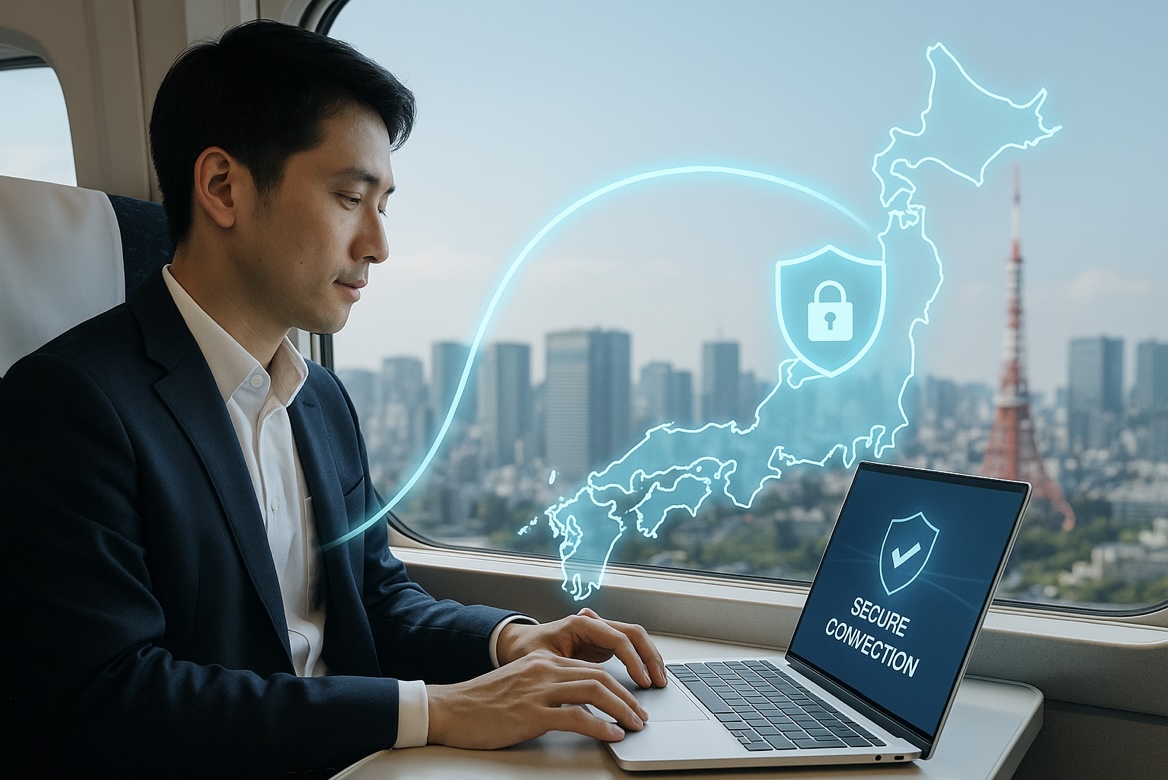Sep 23 (News On Japan) - Japan’s digital life moves at lightning speed. With one of the world’s highest rates of internet penetration, a dense public Wi-Fi network, and a tech-savvy population, millions of people log into bank accounts, stream media, shop, and work remotely every day.

This convenience, however, creates opportunities for cybercriminals. Reports from Japans CERT Coordination Center show phishing remains the dominant tactic in local cyberattacks, while global data breaches still cost organisations more than four million dollars on average. In this environment, protecting your personal data is no longer optional.
This article explains how using a VPN and in particular connecting through a reliable VPN Server for Japan can help you secure your online activity, maintain privacy, and enjoy the full benefits of Japans digital infrastructure. Well also outline best practices so you can use these tools effectively and responsibly.
Understanding VPNs and Why They Matter in Japan
A Virtual Private Network creates an encrypted tunnel between your device and the wider internet. Instead of sending data directly to each website or service you use, your device connects first to a VPN server. That server forwards your traffic while encrypting it, so outsiders on the same network cant easily intercept or read it.
This matters in Japan for two reasons. First, public Wi-Fi is everywhere in cafs, hotels, train stations, airports, even parks. While convenient, shared networks expose your traffic to anyone else connected to the same router. Second, Japans fast internet and widespread mobile use make people frequent targets for phishing and malware campaigns. In early 2025, JPCERT confirmed phishing accounted for the vast majority of local cyber incidents. A VPN wont block a malicious link, but it does keep your connection private and reduces the risk of data being captured in transit.
The Legal Status of VPNs in Japan
Some newcomers worry whether VPNs are legal here. The good news: Japan has no law prohibiting the ordinary, lawful use of VPNs. Businesses and individuals alike use them for security, privacy, or simply accessing services while travelling. What remains illegal are the underlying acts hacking, fraud, copyright infringement which stay illegal whether or not youre using a VPN. In other words, the tool is legal; misuse is not.
Understanding this distinction is important for responsible use. It also reassures readers that choosing a VPN for privacy or legitimate content access wont put them at legal risk.
Why People in Japan Are Turning to VPNs
Japans tech culture means people expect high performance and privacy. Yet at the same time, cyberattacks are growing more sophisticated. Phishing sites imitate banks and government agencies in fluent Japanese; data leaks at large companies expose millions of records; and criminals trade billions of stolen credentials online.
Against this backdrop, more Japanese users from freelancers to multinational companies are adopting VPNs to:
- Protect data on public networks, where encryption shields browsing, logins, and financial transactions from eavesdroppers.
- Preserve privacy at home by adding an extra layer between you and potential trackers.
- Access content securely while travelling, such as Japanese apps or streaming platforms, from overseas.
- Maintain reliable performance. With a quality service, speeds stay high even with encryption, which is crucial in Japans high-speed internet environment.
Global market data supports this trend: the VPN sector is projected to keep expanding rapidly this decade as both security concerns and demand for unrestricted, private access grow.
What to Look for in a VPN Service
Not all VPNs are created equal. To get real protection and usability, prioritise:
- Strong, modern encryption using current tunnelling protocols that resist leaks.
- A transparent privacy policy and, ideally, third-party audits verifying a no-logs commitment.
- Built-in safety features such as a kill switch to prevent traffic from leaving the tunnel if the connection drops and DNS leak protection to keep lookups inside the encrypted channel.
- A server network that includes locations in Japan and nearby countries to deliver low latency for video calls, trading platforms, or high-speed downloads.
- Speed and reliability at peak times, plus compatibility with all your devices.
Choosing a reputable provider that meets these criteria gives you a strong baseline for security and performance.
The Benefits of a VPN Server for Japan
Connecting through a server physically located in Japan offers specific advantages beyond general privacy. By using a Japan-based server:
- You get a Japanese IP address, which can reduce friction with domestic services that verify location, such as streaming platforms or online banking portals.
- You maintain low latency. Traffic stays local, resulting in faster response times for everyday browsing, gaming, or video calls.
- You preserve encryption and privacy. Even while appearing to be in Japan, your traffic remains protected inside the VPN tunnel.
For Japanese residents, this means secure, private connections without losing access to local services. For visitors or expatriates, it provides a way to connect back to Japan securely from overseas.

Safe and Effective Practices
A VPN is one layer of a good security posture, not a silver bullet. Combine it with these habits:
Keep devices and apps updated so security patches close known vulnerabilities before attackers exploit them.
Use strong, unique passwords or passkeys to prevent one breach from cascading into multiple accounts.
Enable multi-factor authentication on important accounts, preferring hardware keys or built-in device prompts over SMS codes.
Be alert to phishing. A VPN cant stop you from clicking a malicious link, so pause before responding to urgent messages or entering credentials.
Choose paid, reputable services over free ones, which often monetise user data or cut corners on security.
Following these practices ensures you get the full benefit of your VPN without introducing new risks.
For Professionals and Organisations
Remote work is now part of mainstream business culture in Japan. Finance teams, tech start-ups, and even government contractors have employees working from home or on the move. In these settings:
Keep remote-access systems patched. Attackers increasingly target outdated VPN gateways and edge devices.
Segment access so one compromised device cant reach everything.
Manage endpoints by enforcing device encryption and remote-wipe policies for bring-your-own-device situations.
Monitor public repositories for leaked credentials and act quickly when issues are found.
These measures complement a VPN rather than replacing it, creating a layered defence against cyber threats.
Responding Quickly to Incidents
Even with good precautions, incidents happen. If you suspect your account has been compromised:
Contact your bank or service provider immediately and follow their fraud procedures.
Change credentials, revoke old sessions, and strengthen multi-factor authentication.
Consider a credit freeze with major bureaus if sensitive information was exposed.
Acting quickly can contain damage and prevent secondary attacks.
The Bottom Line
Japans online world is fast, mobile, and increasingly targeted by cyber threats. A carefully chosen VPN especially when paired with a reliable server in Japan can help protect your data without slowing you down. By combining encryption, good security habits, and a thoughtful approach to online privacy, you can enjoy the benefits of connectivity with far less risk.
Using a VPN for everyday privacy and connecting through a VPN Server for Japan when you need a local IP address are two practical steps you can take right now to strengthen your online security. In 2025 and beyond, thats not paranoia its basic digital hygiene.















